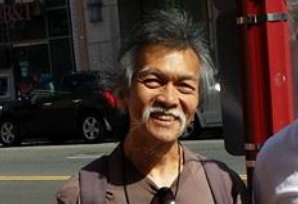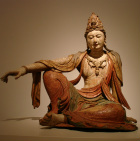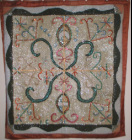Each man has his own vocation. The talent is the call. There is one direction in which all space is open to him. He has faculties silently inviting him thither to endless exertion. He is like a ship in a river; he runs against obstructions on every side but one; on that side all obstruction is taken away, and he sweeps serenely over a deepening channel into an infinite sea. This talent and this call depend on his organization, or the mode in which the general soul incarnates itself in him. He inclines to do something which is easy to him, and good when it is done, but which no other man can do. He has no rival. For the more truly he consults his own powers, the more difference will his work exhibit from the work of any other. His ambition is exactly proportioned to his powers. The height of the pinnacle is determined by the breadth of the base. Every man has this call of the power to do somewhat unique, and no man has any other call ... By doing his work, he makes the need felt which he can supply, and creates the taste by which he is enjoyed. By doing his own work, he unfolds himself.
~ Ralph Waldo Emerson ~
~ Ralph Waldo Emerson ~
|
Origin
Larry Chang was born in 1949 to a Hakka Chinese immigrant family in Jamaica. Raised Catholic by his sisters, he was devout as a child, keeping an altar in his room and often choosing to spend his mid-morning convent school break in prayer in the chapel. To his given names, undoubtedly inspired by the exalted saints Laurence and Anthony, he added that of Ignatius, zealous founder of the Jesuits, as his confirmation name. Not surprisingly, he had intimations of becoming a priest, not through piety alone, but even at a young age, intuiting that it was a socially acceptable way to avoid marriage. The impetus that would nudge him towards the priesthood, however, originated in the same sensibilities which would cause him to question and leave the church as he became more conscious of his homosexuality with the onset of puberty. |
Journey
His piety and devotion would turn to a search for knowledge and truth. He was introduced to Eastern mysticism through the writings of Lobsang Rampa and to alternate realities from reading Edgar Cayce and Jeane Dixon. He fully embraced New Age interests and found he was intuitively adept at reading Tarot cards, natal charts, palms, dreams and tea leaves. An intense series of Ouija sessions led him to experience his dark night of the soul, shifting his focus to the study of metaphysics and New Thought. He successfully completed three years of study of Science of Mind, being very active in his church conducting services and offering treatments. It was tacit that he would become a minister but he balked at following that course. While acknowledging the benefits of Religious Science as a foundation, he questioned its casual dismissal of the negative, the shadow. Through independent study and meditation, he would discover a more satisfying balance and harmony in Taoism, and liberating enlightenment in Zen. |
Service
Still not amenable to formalism and organizational restraint, he has not opted to take refuge. He was cured of any notion of a monastic life by spending time at a Zen monastery. He describes himself though as a Zen humanist but is appreciative of his anomalous life which has led him to be tolerant, compassionate and respectful of many traditions. Thus he resonates with the aboriginal Taino energy of Jamaica, Yoruba-derived loa Elegba, Avalokitesvara or Guanyin, and the gate-keeper archetype of many cultures. A key theme of his is synthesis, combining the spiritual with the scientific, Eastern wisdom with Western knowledge, the archetypal with the current; he offers his insights to anyone who may be so inclined through this most anarchic of media, the internet, and other means. He lives in Washington DC where he has been active in local sustainability and community development. |





